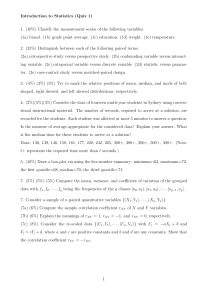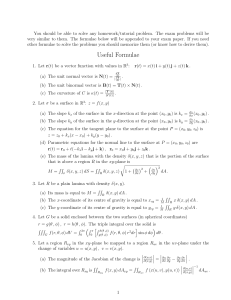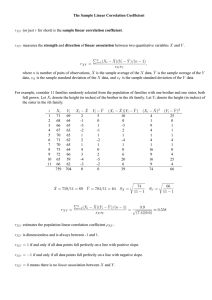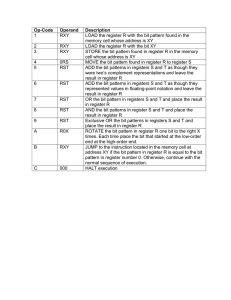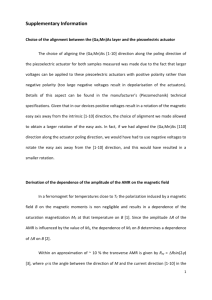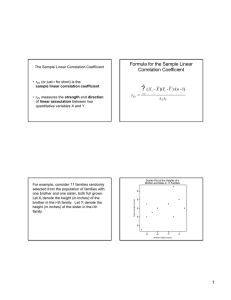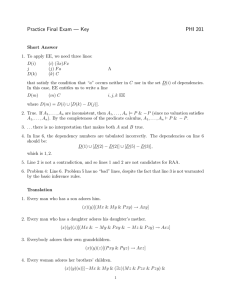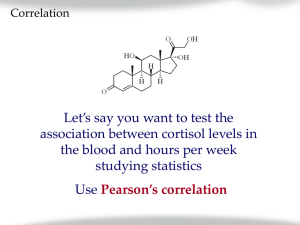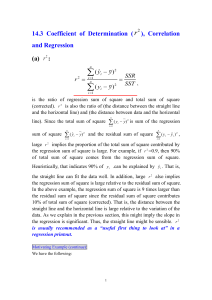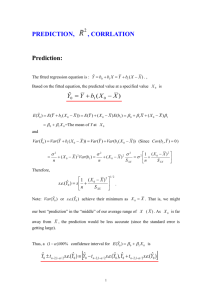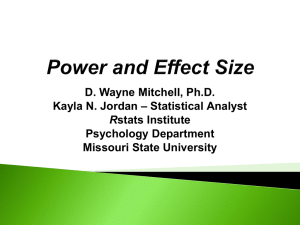Math. 112
advertisement
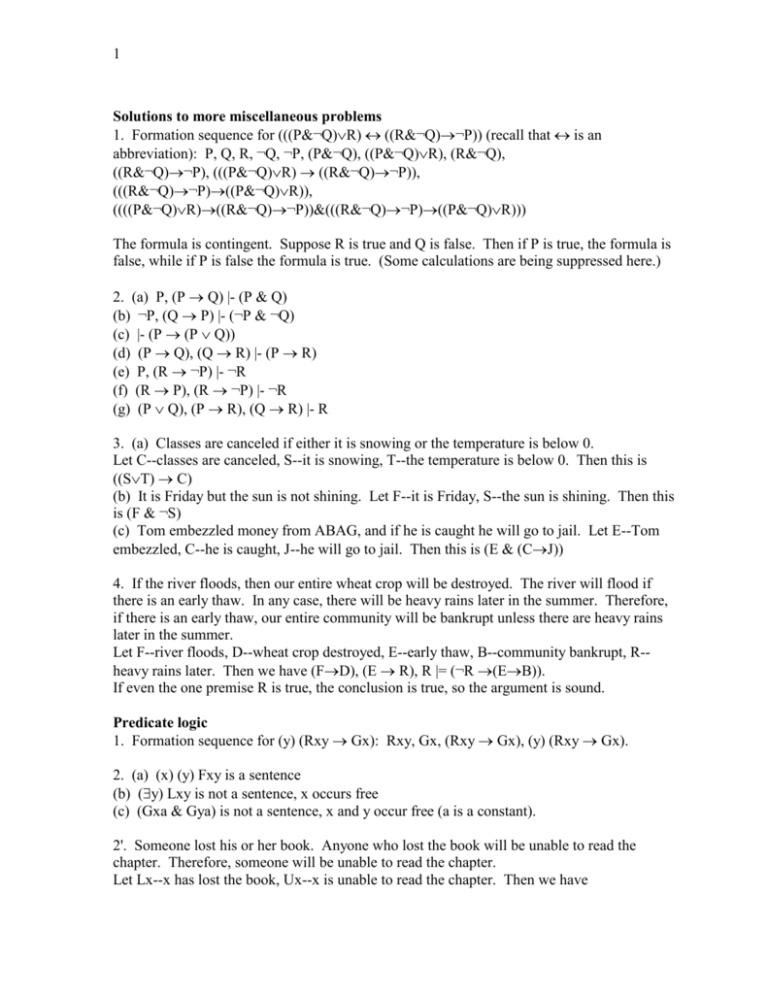
1 Solutions to more miscellaneous problems 1. Formation sequence for (((P&¬Q)R) ((R&¬Q)¬P)) (recall that is an abbreviation): P, Q, R, ¬Q, ¬P, (P&¬Q), ((P&¬Q)R), (R&¬Q), ((R&¬Q)¬P), (((P&¬Q)R) ((R&¬Q)¬P)), (((R&¬Q)¬P)((P&¬Q)R)), ((((P&¬Q)R)((R&¬Q)¬P))&(((R&¬Q)¬P)((P&¬Q)R))) The formula is contingent. Suppose R is true and Q is false. Then if P is true, the formula is false, while if P is false the formula is true. (Some calculations are being suppressed here.) 2. (a) P, (P Q) |- (P & Q) (b) ¬P, (Q P) |- (¬P & ¬Q) (c) |- (P (P Q)) (d) (P Q), (Q R) |- (P R) (e) P, (R ¬P) |- ¬R (f) (R P), (R ¬P) |- ¬R (g) (P Q), (P R), (Q R) |- R 3. (a) Classes are canceled if either it is snowing or the temperature is below 0. Let C--classes are canceled, S--it is snowing, T--the temperature is below 0. Then this is ((ST) C) (b) It is Friday but the sun is not shining. Let F--it is Friday, S--the sun is shining. Then this is (F & ¬S) (c) Tom embezzled money from ABAG, and if he is caught he will go to jail. Let E--Tom embezzled, C--he is caught, J--he will go to jail. Then this is (E & (CJ)) 4. If the river floods, then our entire wheat crop will be destroyed. The river will flood if there is an early thaw. In any case, there will be heavy rains later in the summer. Therefore, if there is an early thaw, our entire community will be bankrupt unless there are heavy rains later in the summer. Let F--river floods, D--wheat crop destroyed, E--early thaw, B--community bankrupt, R-heavy rains later. Then we have (FD), (E R), R |= (¬R (EB)). If even the one premise R is true, the conclusion is true, so the argument is sound. Predicate logic 1. Formation sequence for (y) (Rxy Gx): Rxy, Gx, (Rxy Gx), (y) (Rxy Gx). 2. (a) (x) (y) Fxy is a sentence (b) (y) Lxy is not a sentence, x occurs free (c) (Gxa & Gya) is not a sentence, x and y occur free (a is a constant). 2'. Someone lost his or her book. Anyone who lost the book will be unable to read the chapter. Therefore, someone will be unable to read the chapter. Let Lx--x has lost the book, Ux--x is unable to read the chapter. Then we have 2 (x) Lx, (x) (Lx Ux) |- (x) Ux. 1 1. (x) Lx 2 2. (x) (Lx Ux) 3 3. Lc 2 4. (Lc Uc) 2 UE 2,3 5. Uc 3,4 2,3 6. (x) Ux 5 1,2 7. (x) Ux 1,3,6 A A A MPP EI EE 3. Letting P stand for the relation (among people) of parent (Pxy says that y is a parent of x), translate the following: (a) Everyone has a parent. (x) (y) Pxy (b) Not everyone is a parent. ¬(y) (x) Pxy (c) No-one is the parent of everyone. (y) ¬(x) Pxy (d) Everyone has exactly two parents. (x) (y) (z) (¬y = z & (u) (Pxu (u = yu = z))) 4. Prove the following, using only the 16 primitive rules of inference. (a) (x) Fx, (x) (Fx Gx) |- (x) Gx 1 1. (x) Fx A 2 2. (x) (Fx Gx) A 1 3. Fc 1 UE 2 4. (Fc Gc) 2 UE 1,2 5. Gc 3,4 MPP 1,2 6. (x) Gx 5 UI (b) (x) (y) Gxy |- (x) Gxx 1 1. (x) (y) Gxy A 1 2. (y) Gcy 1 UE 1 3. Gcc 2 UE 1 4. (x) Gxx 3 (c) (x) (y) Rxy |- (y) (x) Rxy 1 1. (x) (y) Rxy A 2 2. (y) Ray A (use EE) 2 3. Rab 2 UE 2 4. (x) Rxb 3 EI 2 5. (y) (x) Rxy 4 UI 1 6. (y) (x) Rxy 1,2,5 EE (d) ((x) Fx (x) Gx) |- (x) (Fx Gx) 1 1. ((x) Fx (x) Gx) A 2 2. (x) Fx A (use E) 2 3. Fc 2 UE 2 4. (Fc Gc) 3 I 5 5. (x) Gx A 5 6. Gc 5 UE 5 7. (Gc Fc) 6 I 1 8. (Gc Fc) 1,2,4,5,7 E 3 1 9. (x) (Gx Fx) 8 (e) (x) Fx |- (x) Fx 1 1. (x) Fx A 1 2. Fc 1 UE 1 3. (x) Fx 2 EI (f) (x) Fx, (x) (Fx Gx) |- (x) Gx 1 1. (x) Fx A 2 2. (x) (Fx Gx) A 3 3. Fc A (use EE) 2 4. (Fc Gc) 2 UE 2,3 5. Gc 3,4 MPP 2,3 6. (x) Gx 5 EI 1,2 7. (x) Gx 1,3,6 EE (g) |- (x) x = x 1. c = c =I 2. (x) x = x 1 UI (h) Fa, a = b, b = c |- Fc 1 1. Fa A 2 2. a = b A 3 3. b = c A 1,2 4. Fb 2,1 =I 1,2,3 5. Fc 4,3 =I (i) |- (x) (y) ((Fx & x = y) Fy) 1 1. (Fc & c = d) 1 2. Fc 1 3. c = d 1 4. Fd 5. ((Fc & c = d) Fd) 6. (y) ((Fc & c = y) Fy) 7. (x) (y) ((Fx & x = y) Fy) UI 1 1 2,3 1,4 5 6 A &E &E =E CP UI UI 5. (a) 1 1. Em A 1 2. (x) Ex 1 UI line 2 not justified because m is not "arbitrary" (b) 1 1. (x) ¬x = c A 1 2. (x) (x) ¬x = x 1 UI line 2 not justified because (x) ¬x = c is not the result of replacing the free occurrences of x in (x) ¬x = x by c; also, c is not arbitrary. (c) 1 1. (x) (Fx ¬c = x) A 1 2. (x) (x) (Fx ¬x = x) 1 EI line 2 not justified because (x) (Fx ¬c = x) is not the result of replacing the free occurrences of x in (x) (Fx ¬x = x) by c
